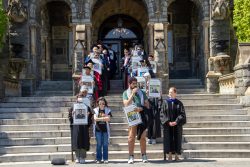On Tuesday, Councilmember David Catania (I-At Large) introduced one of the most promising pieces of legislation to come before the Council in recent memory: the “Healthy D.C.” plan, which would allow the District to provide subsidized health insurance for residents. With the economic situation so bleak, there may be some hesitance to undertake such an ambitious project. Fortunately, the bill also provides a well-thought-out approach to raising revenue that will allow D.C. to operate the program without being financially burdened.
Healthy D.C. would cover approximately 25,000 D.C. residents who do not have employer-provided coverage and cannot afford commercial health insurance but do not qualify for Medicaid or the D.C. Healthcare Alliance program, which provides coverage to low-income residents who are not eligible for Medicaid.
The monthly premium would be between $20 and $100, based on gross income, a rate Young called “almost knock-your-socks-off low” (health insurance generally costs upwards of $150 a month). The program would make health insurance mandatory, with $250 a year fines for those who remain uninsured.
“[Healthy D.C.] is basically a response to what’s considered a hole in our health care system in the district,” Ben Young, Catania’s Chief of Staff, said. “The district is already a hundred miles further ahead of anywhere in the country besides maybe Massachusetts … This would take us out front. We would essentially have universal health care.”
The program’s $55 million price tag does seem daunting at first glance, but the proposal will actually provide immense benefit to the District at essentially no cost to taxpayers.
After monthly premium payments and a $5 million contribution from CareFirst BlueCross BlueShield, which will run the program, the District will have to provide $21 million. Much of that money will come from implementing a 2 percent tax on Health Maintenance Organizations (HMOs). According to Young, 30 other states already have taxes on HMOs, and the fact that they are untaxed in D.C. is “an accident of history … largely due to inaction on the legislature’s part.”
The rest of the funds would come from inching up the tax on commercial insurers by .3 percent and doubling the tax on cigarettes, bringing it up to $2 a pack.
“I don’t think there’s any case to be made that we shouldn’t be taxing tobacco at $2,” Young said. “Frankly, tobacco users have imposed costs on the health care system for a long time without paying in.”
But with so much talk about recession and Mayor Adrian Fenty submitting a remarkably lean budget to the Council, a $55 million program may seem imprudent.
“It’s a hard time to do anything right now but I think they’ve thought about it a lot,” Cynthia Mann, a professor at the Georgetown Health Policy Institute, said. “At the same time the District government is undergoing stress, so are families.”
Especially in these times of economic uncertainty, the District should be taking strides to care for its vulnerable, uninsured residents. The Council has a chance to enact an economically sound proposal that will put D.C. on the vanguard of health care. Let’s hope they capitalize on it.




